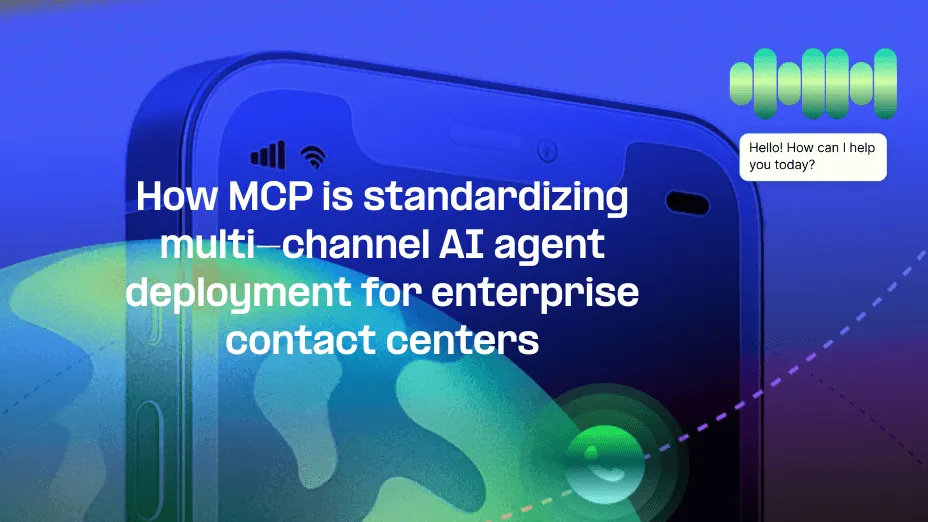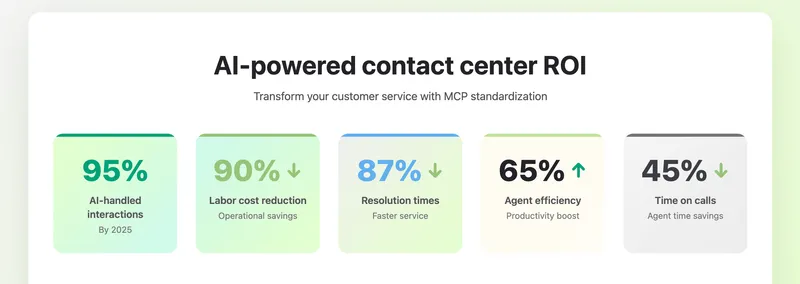Telnyx
How MCP is standardizing multi-channel AI agent deployment for enterprise contact centers
The Model Context Protocol (MCP) offers a solution. This open standard for connecting AI systems to data sources is rapidly becoming the foundation for multi-channel customer service automation.

How MCP is standardizing multi-channel AI agent deployment for enterprise contact centers
Companies are racing to automate customer interactions across voice, SMS, and chat channels. By 2025, AI is projected to handle 95% of all customer interactions, encompassing both voice and text. The benefits are clear: up to 90% reduction in labor costs and 87% reduction in resolution times. Yet many organizations still struggle with fragmented integrations and complex deployment challenges.
The Model Context Protocol (MCP) offers a solution. This open standard for connecting AI systems to data sources is rapidly becoming the foundation for multi-channel customer service automation.
The integration challenge facing contact centers
Modern contact centers juggle multiple communication channels, each with its own technical requirements and integration complexities. Modern consumers use roughly nine different communication channels, including phone, email, SMS, live chat, social media, video calls, self-service portals, mobile apps, and messaging platforms, when contacting businesses. Without standardization, companies maintain separate connectors for each system. This can prove to be a maintenance nightmare that slows innovation and increases costs.
The stakes are high. In a survey 87% of contact center and IT leaders affirmed that conversational AI has reduced agents' effort and costs in the contact center, boosting agent efficiency by 65%. Yet implementation remains complex. Each new data source requires custom integration, making scalable multi-channel automation difficult to achieve.
MCP addresses this challenge directly. It provides a universal, open standard for connecting AI systems with data sources, replacing fragmented integrations with a single protocol. Instead of maintaining dozens of custom connectors, organizations can build against one standard that works across all their communication channels.
Understanding MCP's role in contact center automation
Think of MCP as the USB-C port for AI applications. Just as USB-C provides a standardized way to connect electronic devices, MCP provides a standardized way to connect AI applications to external systems. For contact centers, this means AI agents can seamlessly access customer data from CRM systems, retrieve order information from databases, and coordinate responses across voice, SMS, and chat channels all through a single protocol.
The protocol's rapid adoption speaks to its practical value. In May 2025, Microsoft released native MCP support in Copilot Studio, offering one-click links to any MCP server, new tool listings, streaming transport, and full tracing and analytics. Google DeepMind confirmed MCP support in upcoming Gemini models, describing the protocol as "rapidly becoming an open standard for the AI agentic era".
For contact centers, MCP enables several practical applications:
| Application | How it works | Benefit |
|---|---|---|
| Unified customer context across channels | AI agents maintain full interaction history when customers switch between chat, voice, and SMS | Eliminates need for customers to repeat information, reducing frustration and call times |
| Real-time data access | Pull current inventory levels, order status, or account information directly from enterprise systems during interactions | Provides accurate, up-to-date responses instantly without putting customers on hold |
| Automated workflow coordination | Execute actions like processing returns, scheduling appointments, or updating customer records across multiple backend systems | Reduces manual work and human error while speeding up resolution times |
Practical deployment considerations for enterprises
While MCP simplifies integration architecture, successful deployment requires careful planning. Security remains paramount. Research by Knostic in July 2025 involved scanning nearly 2,000 MCP servers exposed to the internet, with all verified servers lacking any form of authentication. Organizations must implement proper authentication and access controls from day one.
- Start with focused use cases. Rather than attempting to automate every customer interaction immediately, identify high-volume, repetitive queries that can deliver quick wins. FAQ automation for your top 20 most common questions typically handles 40-60% of incoming volume and provides immediate ROI.
- Consider your existing infrastructure. MCP works alongside current systems rather than replacing them. MCP complements agent orchestration frameworks like LangChain, LangGraph, BeeAI, LlamaIndex and crewAI, but it does not replace them. This means you can adopt MCP incrementally, starting with pilot programs before scaling across your entire contact center.
- Data preparation is critical. Since 39% of leaders struggle with data accessibility, spend 40% of your prep time on data organization. Clean historical ticket data, standardize customer interaction logs, and establish clear escalation procedures before implementing MCP-based automation.
Building for multi-channel excellence with direct network access
The effectiveness of MCP-based AI agents depends heavily on the underlying communication infrastructure. Latency matters, especially for voice interactions where even small delays disrupt natural conversation flow. This is where Telnyx's direct-to-carrier network architecture provides a significant advantage.
Unlike aggregators that route traffic through multiple intermediaries, Telnyx owns and operates its global network infrastructure. This direct access means lower latency for voice AI interactions, more reliable message delivery for SMS-based customer service, and consistent performance across all channels. When your AI agent needs to process a customer's voice request, transcribe it, query multiple databases via MCP, and generate a response, every millisecond counts.
Telnyx's Voice API and Messaging API integrate seamlessly with MCP implementations, providing the programmable foundation for multi-channel AI deployment. Built-in support for major CRM and CCaaS platforms means your MCP servers can access customer context while maintaining compliance and security standards required for enterprise deployments.
Measuring success and scaling operations

Success with MCP-based automation requires clear metrics and gradual scaling. Aim for 80%+ customer satisfaction with AI interactions within 6 months. Top performers achieve 87.2% positive ratings. Track accuracy rates (target 85% or higher), escalation rates (aim for less than 15%), and customer effort scores to ensure quality remains high as you scale.
The financial impact can be substantial. Support agents utilizing AI tools can handle 13.8% more customer inquiries per hour, leading to increased productivity without additional staffing costs. Organizations report cost reductions of 25% or more through AI-driven automation, with some achieving dramatic results, i.e., NIB Health Insurance saved $22 million by automating customer service processes.
Human agents remain essential, but their roles evolve. Use the 45% time savings on calls to focus agents on complex issues, relationship building, and proactive outreach. The most successful implementations augment human capabilities rather than replacing staff, often expanding teams to handle growth enabled by improved efficiency.
The path forward for enterprise contact centers
MCP represents more than a technical standard. It's enabling a fundamental shift in how enterprises approach customer service automation. The MCP ecosystem is growing rapidly, and there are already thousands of servers available today. Early adopters like Block and Apollo demonstrate that production-ready implementations are achievable today, not years in the future.
For organizations ready to move forward, the combination of MCP's standardization and robust communication infrastructure creates new possibilities. Multi-channel AI agents can provide consistent, context-aware service whether customers reach out via voice, SMS, or chat. Real-time data access ensures accurate responses. Automated workflows handle routine tasks while human agents focus on building relationships and solving complex problems.
The question isn't whether to adopt AI-powered customer service, as 76% of contact centers plan to invest in AI within the next two years. The question is how to implement it effectively. MCP provides the standard. Direct network infrastructure provides the performance. Together, they enable the scalable, reliable multi-channel automation that modern customer service demands.
Ready to explore how MCP and programmable communications can automate your customer interactions? Connect with Telnyx to discuss your multi-channel AI strategy and see how direct network access can improve your deployment's performance and reliability.
Want to stop robocalls and fraud? Join our subreddit.
Share on Social
Jump to:
The integration challenge facing contact centersUnderstanding MCP's role in contact center automation**Practical deployment considerations for enterprises**Building for multi-channel excellence with direct network accessMeasuring success and scaling operationsThe path forward for enterprise contact centersSign up for emails of our latest articles and news
Related articles
